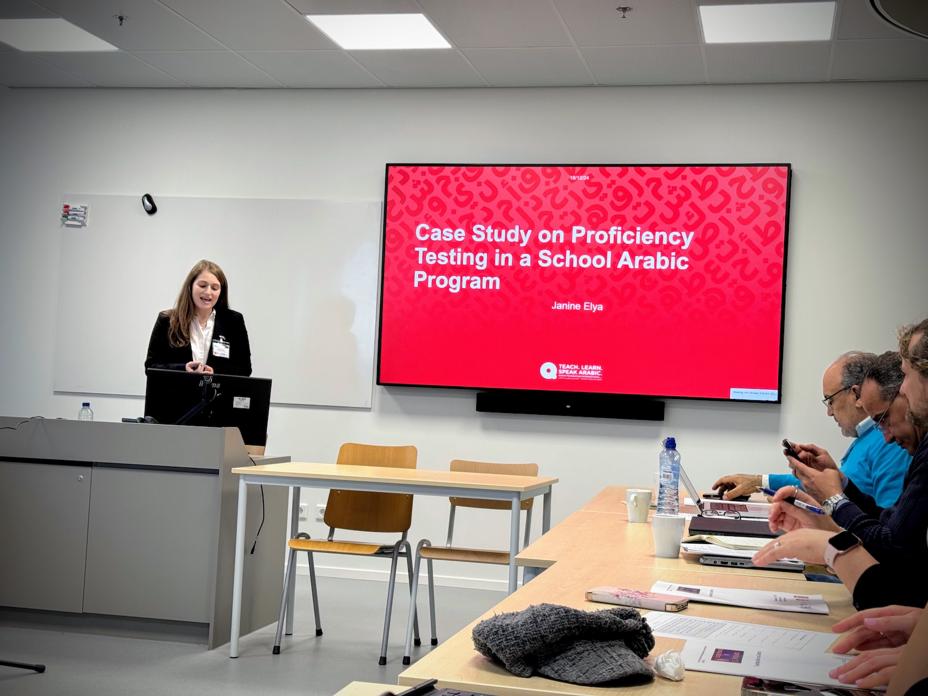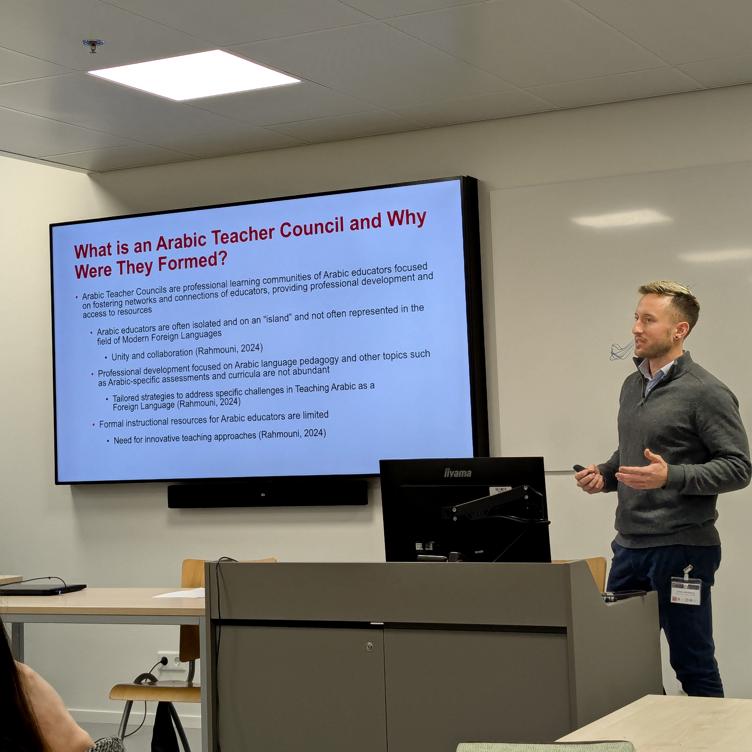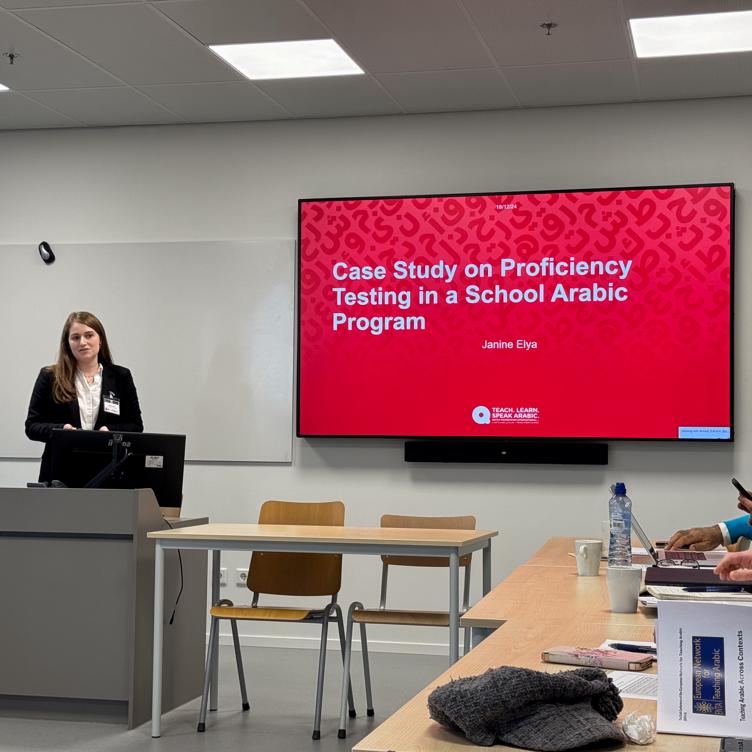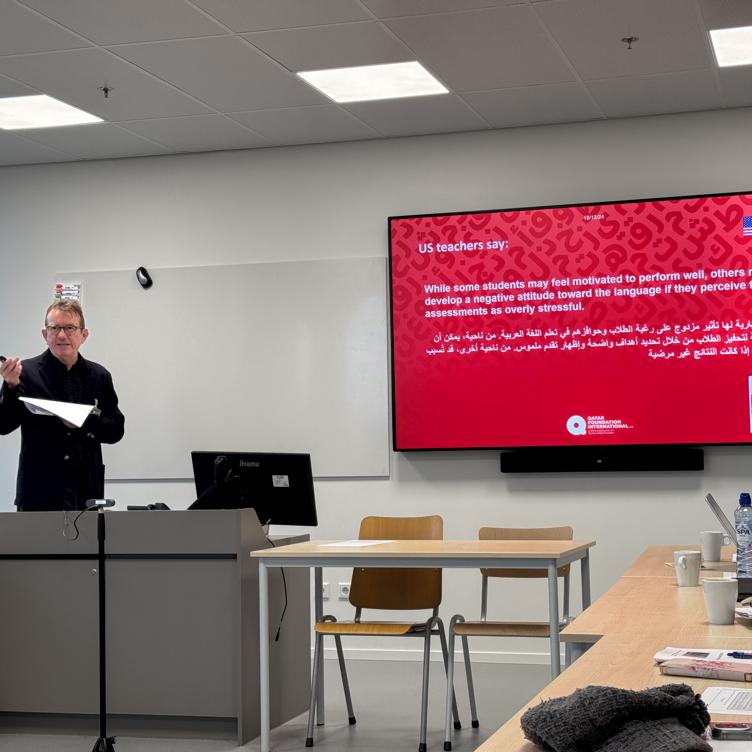
Something went Wrong
Try entering your email again or contact us at support@qfi.org
Try entering your email again or contact us at support@qfi.org
You’ll receive an email with a confirmation link soon.
Apr 7, 2025
Leiden University, Netherlands – Qatar Foundation International (QFI) had all three of its submitted presentations accepted at the prestigious Sixth Conference of the European Network for Teaching Arabic (ENTA-6), held from December 18–19, 2024, at Leiden University in the Netherlands. This opportunity allowed QFI to contribute to global discussions and share insights that support the advancement of Arabic language teaching practices. The conference brought together educators, researchers, and policymakers from across Europe, providing a platform to explore innovations, challenges, and opportunities in Arabic language education. In addition to QFI's team, other QFI-supported educators were also selected to present, amplifying the voices of educators and reinforcing QFI's collaborative role in shaping the future of Arabic teaching worldwide.
ENTA-6, hosted by the European Network for Teaching Arabic in collaboration with the Leiden University Institute for Area Studies, offered a unique opportunity to foster collaboration across European Arabic education stakeholders, exploring practical solutions to advance the field.
QFI’s milestone acceptance underscores its role in amplifying K-12 voices at a conference traditionally centered on higher education. By participating alongside policymakers, researchers, and educators, QFI bridges the gap between grade school and university-level Arabic education, fostering stronger collaboration within the ecosystem. This achievement highlights QFI’s commitment to advancing Arabic teaching practices and elevating educators on international platforms.
The inclusion of QFI-supported educators and research reflects the organization’s broader vision to connect teaching communities worldwide, ensuring that new ideas and collaborative efforts strengthen Arabic language education at all levels. QFI’s involvement builds on its efforts to facilitate greater representation of teachers and educators in global convenings, a process that began with its participation in ACTFL this past November.
Featured QFI Presentations
QFI’s first presentation was by Tony Calderbank, QFI’s United Kingdom Consultant, who presented a comparative study titled "Contrastive approaches to teaching Arabic in schools in UK and USA: the Impact of a high stakes assessment." This research analyzed the influence of the UK’s standardized General Certificate of Secondary Education (GCSE) exam compared to the flexible assessment models available to Arabic educators in the United States. The findings underscored the impact of “washback”—the way testing shapes teaching methods—noting that UK teachers often lean toward accuracy-based instruction, while US educators prioritize fluency and communicative skills.
Tony stated: “By examining how assessments influence teaching, we can better understand the tools needed to balance accuracy with creativity. QFI’s research helps identify pathways to more effective and engaging Arabic language education.”
QFI Research Officer Janine Elya presented a “Case Study on Proficiency Testing in a School Arabic Program” which focused on analyzing Arabic proficiency trends among students using STAMP assessments over three years at a public school in Washington, DC. This research demonstrated how proficiency assessments not only measure progress but also provide actionable insights for educators to refine their teaching strategies. By leveraging such data, teachers can design personalized lesson plans and help students track skill development across four skills: Reading, writing, listening, and speaking.
Janine emphasized: "Standardized assessments are crucial for understanding students’ proficiency in the four skills. This research demonstrates how data-driven tools empower educators to tailor learning experiences and drive student success. I hope this case study inspires differentiated teaching for varied skill levels and underscores the unique, complex journey each student takes toward proficiency."
Lastly, Chase Smithburg, QFI Senior Program Officer, focused on presenting "Arabic Teacher Councils: Communities of Practice, in Practice." This research highlighted QFI’s Arabic Teacher Councils (ATCs) as essential platforms for supporting educators and fostering collaboration. Launched in 2012, ATCs address gaps in professional development by enabling Arabic teachers to design and drive initiatives that reflect their local needs. It also compared the UK and US ATC models, emphasizing how such councils promote cross-sector collaboration between K-12 and higher education, strengthening the broader Arabic education ecosystem.
Chase noted that “ATCs build vital connections across K-12 and higher education, creating inclusive spaces for educators to share experiences, collaborate, and innovate together—ensuring Arabic teachers feel supported and empowered.”
QFI’s participation in ENTA-6 underscores its commitment to advancing Arabic language education by amplifying teacher voices, sharing research, and fostering collaboration among K-12 educators, researchers, and policymakers. As it expands its research initiatives, QFI remains dedicated to addressing critical gaps and ensuring Arabic language learning is accessible, professional, and globally recognized. This milestone reflects QFI’s vision of connecting communities and driving innovation in Arabic teaching worldwide.
About Qatar Foundation International (QFI)
Qatar Foundation International (QFI), based in Washington, DC, is dedicated to advancing the value of teaching and learning Arabic as a global language.
Image 1 of 3




